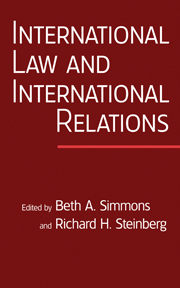Book contents
- Frontmatter
- Contents
- Contributors
- Abstracts
- Preface
- Editors' Note
- PART I INTERNATIONAL REGIMES THEORY: DOES LAW MATTER?
- PART II COMMITMENT AND COMPLIANCE
- PART III LEGALIZATION AND ITS LIMITS
- PART IV INTERNATIONAL LAW AND INTERNATIONAL NORMS
- 10 Quasi-States, Dual Regimes, and Neoclassical Theory: International Jurisprudence and the Third World (1987)
- 11 Which Norms Matter? Revisiting the “Failure” of Internationalism (1997)
- 12 The Territorial Integrity Norm: International Boundaries and the Use of Force (2001)
- PART V TREATY DESIGN AND DYNAMICS
- PART VI LAW AND LEGAL INSTITUTIONS
- PART VII OTHER SUBSTANTIVE AREAS OF INTERNATIONAL LAW
- References
- Index
12 - The Territorial Integrity Norm: International Boundaries and the Use of Force (2001)
Published online by Cambridge University Press: 05 June 2012
- Frontmatter
- Contents
- Contributors
- Abstracts
- Preface
- Editors' Note
- PART I INTERNATIONAL REGIMES THEORY: DOES LAW MATTER?
- PART II COMMITMENT AND COMPLIANCE
- PART III LEGALIZATION AND ITS LIMITS
- PART IV INTERNATIONAL LAW AND INTERNATIONAL NORMS
- 10 Quasi-States, Dual Regimes, and Neoclassical Theory: International Jurisprudence and the Third World (1987)
- 11 Which Norms Matter? Revisiting the “Failure” of Internationalism (1997)
- 12 The Territorial Integrity Norm: International Boundaries and the Use of Force (2001)
- PART V TREATY DESIGN AND DYNAMICS
- PART VI LAW AND LEGAL INSTITUTIONS
- PART VII OTHER SUBSTANTIVE AREAS OF INTERNATIONAL LAW
- References
- Index
Summary
In the late twentieth century many international relations scholars and observers have commented on the declining importance of interstate territorial boundaries for a variety of national and transnational activities. Concurrently, something very significant has been happening in international relations that raises questions concerning judgments of the decreasing importance of boundaries: the growing respect for the proscription that force should not be used to alter interstate boundaries – what is referred to here as the territorial integrity norm. The development of a norm concerning respect for states' territoriality is particularly important because scholars have established that territorial disputes have been the major cause of enduring interstate rivalries, the frequency of war, and the intensity of war. After reviewing studies on interstate wars, John Vasquez wrote that “Of all the issues over which wars could logically be fought, territorial issues seem to be the ones most often associated with wars. Few interstate wars are fought without any territorial issue being involved in one way or another.”
In this article I trace the dramatic change in attitudes and practices of states in the Westphalian international order concerning the use of force to alter interstate boundaries. In the first section I briefly outline the attitudes and practices of states regarding territorial boundaries from the seventeenth century until World War II. In the second section I focus on the remarkable changes in beliefs and practices from World War II until the present.
- Type
- Chapter
- Information
- International Law and International RelationsAn International Organization Reader, pp. 259 - 290Publisher: Cambridge University PressPrint publication year: 2007

